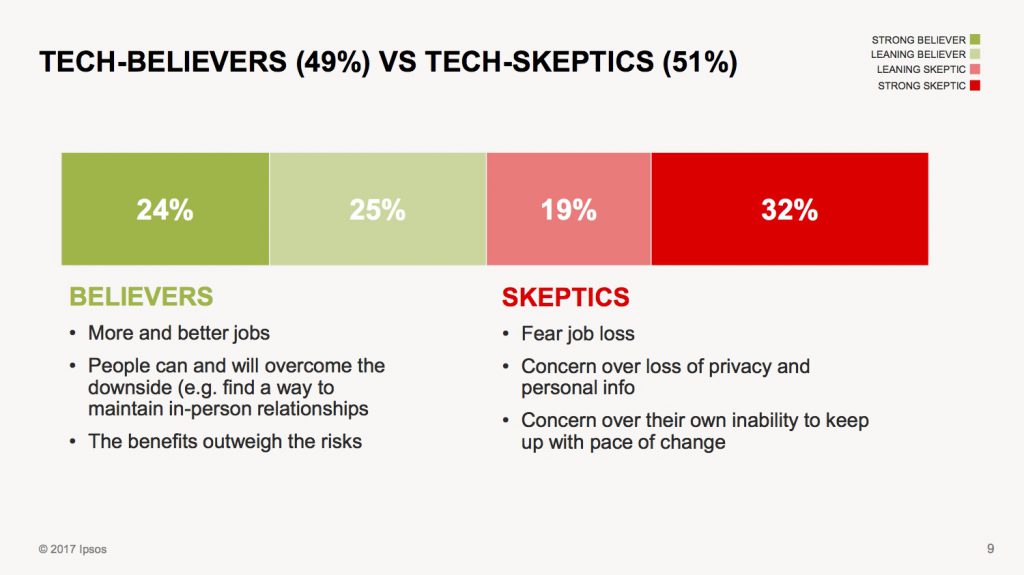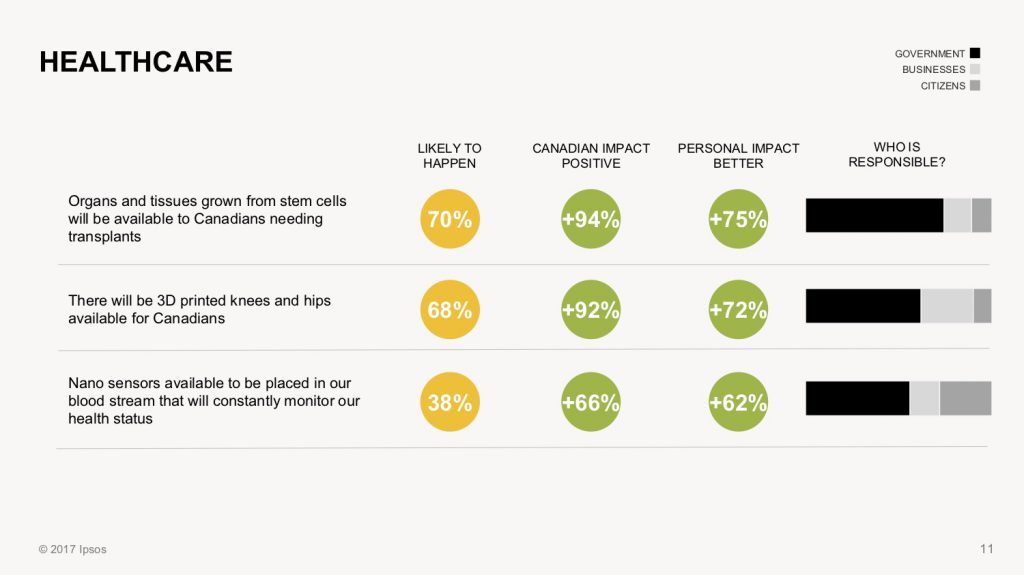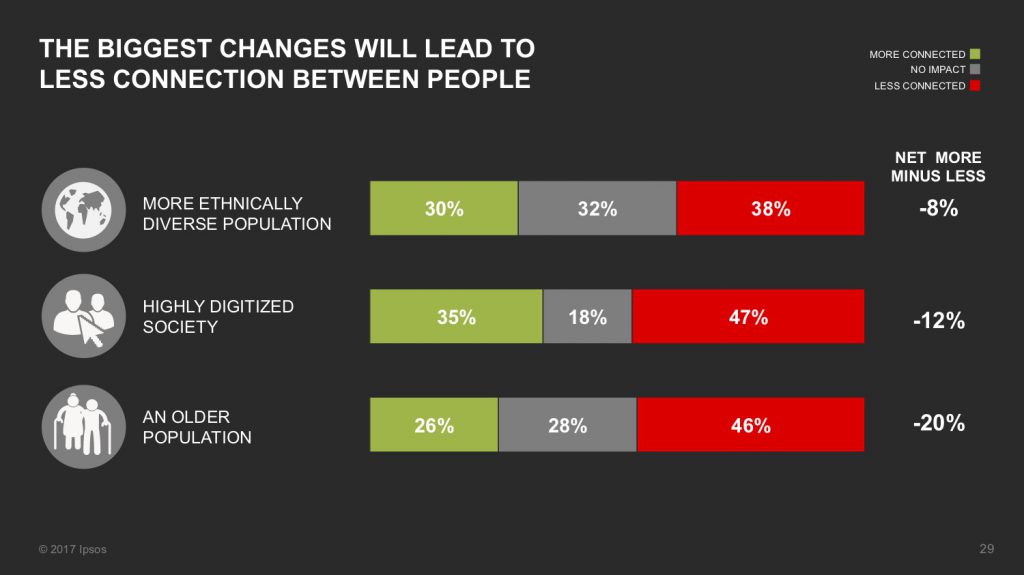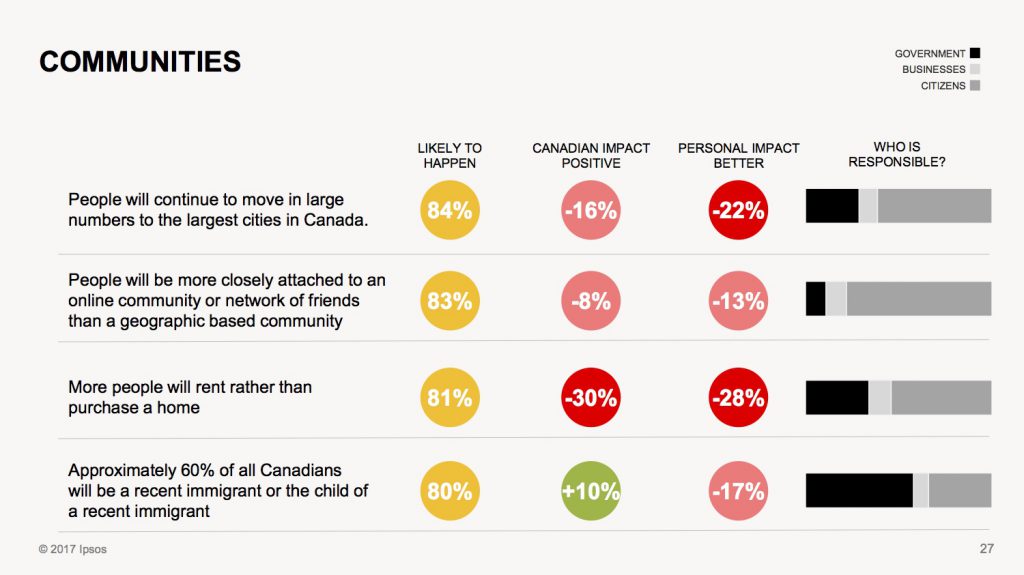CanadaNext: What Canadians think about future tech and why you should care
Technology and demography are rapidly merging. This is creating challenges and opportunities for sectors and organizations across Canada. In September, I attended the CanadaNext Symposium led by Ipsos, IBM, and Canada 2030. It was attended by federal and provincial policy developers, NGOs, academics, and representatives from sectors like banking and energy. I revisited the symposium’s key highlights last week when Ipsos presented to Ottawa Civic Tech — a group focussed on strong communities and fixing social problems. Here are the main takeaways about how Canadians currently think and feel about future tech, and why it matters.
What do Canadians really think about future tech?
We’re skeptical. And intrigued.
That’s what Ipsos uncovered when it surveyed 2000 Canadians and asked them about 50 probable future scenarios related to the adoption of new technologies (e.g., autonomous vehicles, robots, digital currency).
Participants were asked:
- How likely the scenarios were to occur
- How they would affect Canada and them personally
- Were a given scenario to happen, would it be something they’d want governments to regulate closely, something they’d trust businesses to do, or something that citizens would have to look after themselves
Different sectors and organizations will find different aspects of the study’s findings useful.
A changing Canada
Ipsos’s findings were rooted in some important facts about demography:
-
- Fertility/Aging: Canadians continue to have fewer children (average Canadian woman has 1.6 children today), and seniors outnumber children.
- Urbanization: Most of the world’s population lives in urban centres and the movement of people from rural to urban areas is accelerating in Canada.
- Multiculturalism: Canada leads G8 countries in population growth fuelled only by immigration.
Tech skeptics vs tech believers
So. The findings.
Surprisingly, we’re not a nation of true tech believers. In fact, we’re evenly split between tech believers and tech skeptics.
The value of knowing this about the Canadian psyche is huge. Understanding how Canadians think and feel about these issues can help us to continuously adapt to and prepare for changes in our society. There are opportunities to market to the believers but more importantly, how will we bring the skeptics along?
Seven in 10 Canadians think the world is changing too fast, and over 50% of Canadians are having trouble keeping up with the pace of change. And, can you believe that only 50% of Canadians think their overall quality of life will improve in the next 10 years?
3D printed knees? Yes please. (They’re free, right?)
While Canadians are open to private health innovation/R&D, they still expect governments to manage and pay for tech-infused health innovations like 3D printed joints.
When it comes to healthcare, nearly 70% of Canadians expect that in the future, organs and tissues grown from stem cells, or 3D printed knees and hips will be available to those who need them. Overwhelmingly, they also think this will be good for the country and for them personally.
While we’re hopeful about new tech, we still want the same type of healthcare system in place to pay for procedures. Is that realistic?
The future of community
How do Canadians feel about their communities today, and about how their lives will change as technology becomes more prevalent in them? There are a couple of important findings to keep in mind:
- Canadians aren’t comfortable with how their communities are changing. Most of them feel that social cohesion is fading. A full 83% of us say that in the future we’ll be more connected to online communities than physical ones. Nearly half of us also think that an older, more ethnically diverse population will result in our being less connected.
- Despite this, the majority of Canadians are optimistic about how tech can improve everyday lives in cities.
60% of Canadians agree that data-enabled, connected cities could better allocate resources and make better decisions. 80% think that smart cities would have a positive impact on the country overall. But, they expect governments to regulate this infusion of technology into more aspects of everyday life. This raises lots of questions given that tech giants like Google are bringing smart city plans forward for places like Toronto.
The face of municipal services may well change as smart cities emerge, and Canadians believe that local business and transportation around the city will also be affected. Of respondents, 76% anticipate there will be half as many retail stores, and 54% believe that 10% of cars and trucks on our roads will be driverless.
No wonder their vision of their community is changing. What would cities look like without a retail core? How will a more tech-wired population further affect social connectedness and cohesion?
The data dilemma: Who owns it?
Canadians believe they own the personal data collected by governments, and that the same governments should protect and regulate its use.
We’re in the age of big data and Canadians are affected by what they hear in the media on this topic. Ipsos’s survey found that 69% of Canadians agree that when they think about future advances in technology, they worry about the privacy and security of their personal information. A full 75% of Canadians say that data collected by governments should be owned by the citizens they collect it from. And 74% say the same about data collected by private companies. But we’re creatures of convenience—in the same breath we’ll ask for better services and tighter controls. For now, convenience trumps security, so we continue to share our data.
Jennifer Birch, Vice President at Ipsos wrote a thoughtful piece suggesting the private sector might leverage data as a new resource to offer citizens solutions that governments would traditionally provide. She wondered whether governments would become data brokers and be edged out of the service delivery game. What would that mean for our democratic institutions? Could the government charge royalty fees for access to its, or rather, our data?
Where to from here?
With an aging population, increased urbanization, increased ethnic diversity, less social cohesion, and strains on our tax system, we have many challenges in front of us. Canadians’ attitudes about the future and technology aren’t all rosy. There’s a sense of individual helplessness and low trust in authorities to manage the complexity of it all.
Fortunately, we can work together to make a distinct difference. By using creativity, design, and technology to solve some of our most pressing social problems we can pave the way for a positive future and convert tech skeptics into tech believers.
I look forward to following the evolution of the CanadaNext study. Ipsos plans to do more analysis and share more details in the coming months and future iterations of the study itself are in the works.
Ipsos is a valued partner and the leading market research company in Canada. They have the privilege of working with hundreds of Canada’s most influential private and public sector organizations. We’re well positioned to help you engage with your audiences about the future and learn what it will mean for your business. Reach out to discuss the possibilities.




